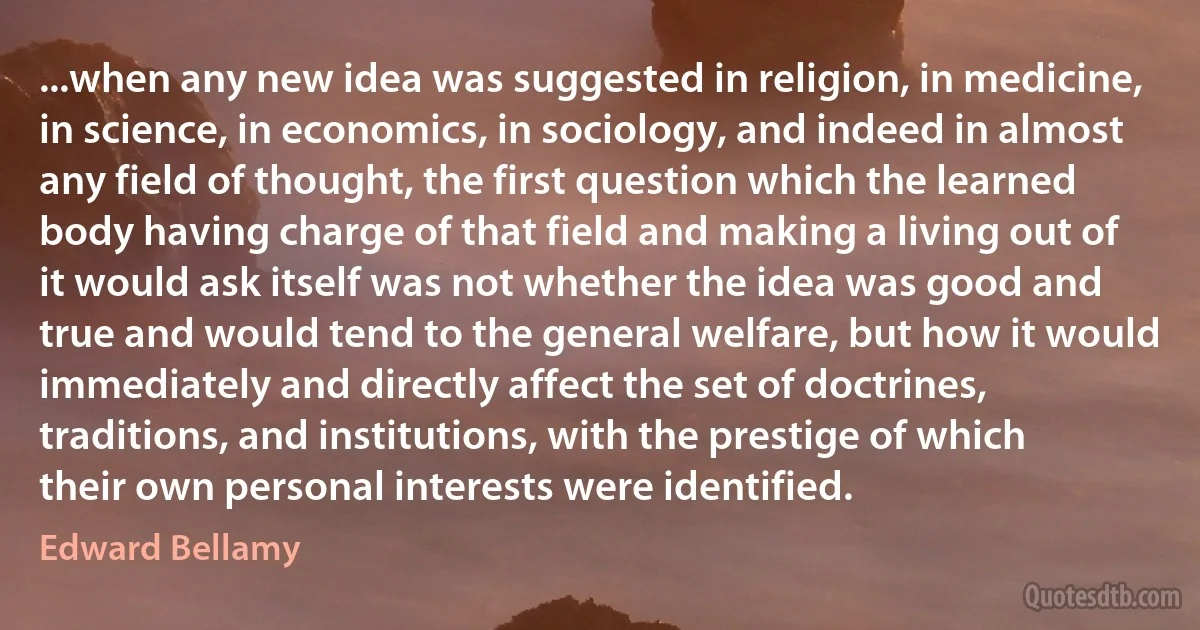Economics Quotes - page 33
I have not been able to lay my hands on any notes as to Mathematico-economics that would be of any use to you. I have very indistinct memories of what I used to think on the subject. I never read mathematics now: in fact I have even forgotten how to integrate a good many things.
But I know I had a growing feeling in the later years of my work at the subject that a good mathematical theorem dealing with economic hypotheses was very well unlikely to be good economics: and I went more and more on the rules-(1) Use mathematics as a shorthand language, rather than as an engine of inquiry. (2) Keep to them till you have done. (3) Translate into English. (4) Then illustrate by examples that are important in real life. (5) Burn the mathematics. (6) If you can't succeed in (4), burn (3). This last I do often.

Alfred Marshall
The explanation Marxism offered of the significance of History was ludicrously simple, and in this very simplicity lay its charm, and its strength. The whole history of the world was merely the record of the struggle of classes. Religion, philosophy, science, technics, music, painting, poetry, nobility, priesthood, Emperor and Pope State, war, and politics - all are simply reflections of economics. Not economics generally, but the "struggle" of "classes." The most amazing thing about this ideological picture is that it was ever put forward seriously, or taken seriously.

Francis Parker Yockey
In science, technology, economics, industry, agriculture, armaments, and democratic rule, America, Europe, and Japan are generations ahead. But the Islamic world retains something the West has lost: a desire to have children and the will to carry on their civilization, cultures, families, and faith.

Pat Buchanan
The profits derived from slavery are more extreme than I think are commonly acknowledged. As I said yesterday, in 1860, the combined worth of the 4 million enslaved black people in this country was some $3 billion, nearly $75 billion in today's share of dollars. Cotton, in 1860, was this country's largest export-not just its largest export, it was the majority of exports out of this country. So, from a financial perspective, just the economics of it, it's absolutely impossible to imagine America without enslavement.

Ta-Nehisi Coates
The Labour party is no class champion. In politics it is frankly democratic, in economics it is co-operative... It was not bought into being to revenge the wage-earner and mercilessly smash the capitalist... Capitalist and labourer alike feel that some new order must evolve if England is to exist.

Ramsay MacDonald
The Saviour of the future - if ever he comes - will not preach a new Gospel. He will merely utilize my aristocracy, he will make effective the goodwill and the good temper which are already existing. In other words, he will introduce a new technique. In economics, we are told that if there was a new technique of distribution there need be no poverty, and people would not starve in one place while crops were being ploughed under in another. A similar change is needed in the sphere of morals and politics. ... Not by becoming better, but by ordering and distributing his native goodness, will Man shut up Force into its box, and so gain time to explore the universe and to set his mark upon it worthily. At present he only explores it at odd moments, when Force is looking the other way, and his divine creativeness appears as a trivial by-product, to be scrapped as soon as the drums beat and the bombers hum.

E. M. Forster
Macro rational expectations, as I have labeled the hypothesis, seems to say that expectations in an economist's model must be perfectly consistent with his model that embodies these expectations. In other words, the agents of his model must all share his views of the relevant economic mechanisms, as well as his data. Why? Because if he holds them they must believe they are God's truth and, if so, rational people can have no other views (and of course we should never ask how they would come by these views and data, that not even other specialists may have heard of yet, let alone accepted). I submit that this view is pretty absurd--I would almost say offensive! I certainly believe that I know more about economics and the economy than (almost) everybody else, and i can even prove it: If everybody shared my vies, then the economy could not be in today's troubles (though it might conceivably be in some different ones!).

Franco Modigliani
Instead, I would concede her a point of uncertain importance. There isn't really a great deal to economics, considered as a logical structure based upon a few indisputable axioms about the world. ... A logician is a wondrous creature, but he cannot distinguish between the two simple errors: if A = B, and B = C, then (1) A = 1.01C, and (2) A = 10⁶⁵C. An economist can.

Joan Robinson
In 1879, American economist Francis Walker tried to explain why members of his profession were in such "bad odor amongst real people". He blamed it on their inability to understand why human behavior fails to comply with economic theory. We do not always act the way economists think we should, mainly because we're both less selfish and less rational than economists think we are. Economists are being indoctrinated into a cardboard version of human nature, which they hold true to such a degree that their own behavior has begun to resemble it. Psychological tests have shown that economics majors are more egoistic than the average college student. Exposure in class after class to the capitalist self-interest model apparently kills off whatever prosocial tendencies these students have to begin with. They give up trusting others, and conversely others give up trusting them. Hence the bad odor.

Frans de Waal
He worked as a research scholar on labour problems at the University of Allahabad (1920-1921) and became Professor of Economics at the National College (Bombay) in 1921. He joined the Non-Cooperation Movement the same year. In 1922, he become Secretary of the Ahmadabad Textile Labour Association in which he worked until 1946. He was imprisoned for Satyagraha in 1932, and again from 1942 to 1944.

Gulzarilal Nanda
Pauperism, political economy, and the discovery of society were closely interwoven. Pauperism fixed attention on the incomprehensible fact that poverty seemed to go with plenty. Yet this was only the first of the baffling paradoxes with which industrial society was to confront modern man. He had entered his new abode through the door of economics, and this adventitious circumstance invested the age with its materialist aura. To Ricardo and Malthus nothing seemed more real than material goods. The laws of the market meant for them the limit of human possibilities. Godwin believed in unlimited possibilities and hence had to deny the laws of the market. That human possibilities were limited, not by the laws of the market, but by those of society itself was a recognition reserved to Owen who alone discerned behind the veil of market economy the emergent reality: society. However, his vision was lost again for a century.

Karl Polanyi
My argument implies that, divorced from history, economics is a rudderless ship and economists without history have not much idea of where it is sailing to. But I am not suggesting that these defects can be remedied simply be getting some charts, that is by paying more attention to concrete economic realities and historical experience. As a matter of fact, there have always been plenty of economists ready and anxious to keep their eyes open. The trouble is that, if in the mainstream tradition, their theory and method as such has not helped them to know where to look and what to look for.

Eric Hobsbawm
In the book 1984, George Orwell pictured a totalitarian society that has become the standard view of the total state of the future. Everyone's life was controlled by computer, and there was a TV camera in every room to monitor everyone's activities... Fortunately, such dramas overlook the fundamentals of economics. The larger the government, the less efficient and productive is the economy. Slaves don't produce with the enthusiasm, incentive, and imagination that free people do. Bureaucratic programs just don't work as intended... So while the totalitarian state may include a TV camera in every room, I doubt that the camera will work.

Harry Browne
But how is it you know all this about how large the ocean is? I thought you girls were limited to pretty chatter and the economics of housekeeping. I didn't know you learned geography.”
"We don't,” she said, somewhat shamefaced. "But we learned to read, and once one can read, one can learn anything.

Sheri S. Tepper
Here it was again, the most ancient of roadforks, one that Paul had glimpsed before, in Kroner's study, months ago. The choice of one course or the other had nothing to do with machines, hierarchies, economics, love, age. It was a purely internal matter. Every child older than six knew the fork, and knew what the good guys did here, and what the bad guys did here. The fork was a familiar one in folk tales the world over, and the good guys and the bad guys, whether in chaps, breechclouts, serapes, leopardskins, or banker's gray pinstripes, all separated here.
Bad guys turned informer. Good guys didn't - no matter when, no matter what.

Kurt Vonnegut
The uncertainty of Socialists themselves concerning the organization of the society they are wishing for, paralyses their energy up to a certain point.
At the beginning, in the forties, Socialism presented itself as Communism, as a republic one and indivisible, as a governmental and Jacobin dictatorship, in its application to economics. Such was the ideal of that time. Religious and freethinking Socialists were equally ready to submit to any strong government, even an imperial one, if that government would only remodel economic relations to the worker's advantage.
A profound revolution has since been accomplished, especially among Latin and English peoples. Governmental Communism, like theocratic Communism, is repugnant to the worker.

Peter Kropotkin
We've been working to restore the political system to bring out all that was best in the British character. That's what we've done. It's called Thatcherism – it's got nothing to do with Thatcher except that I was merely the vehicle for it. But it is in everything I do. It's a mixture of fundamentally sound economics. You live within your means; you have honest money, so therefore you don't make reckless promises. You recognise human nature is such that it needs incentives to work harder, so you cut your tax. It is about being worthwhile and honourable. And about the family. And about that something which is really rather unique and enterprising in the British character – it's about how we built an Empire, and how we gave sound administration and sound law to large areas of the world. All those things are still there in the British people aren't they?

Margaret Thatcher



